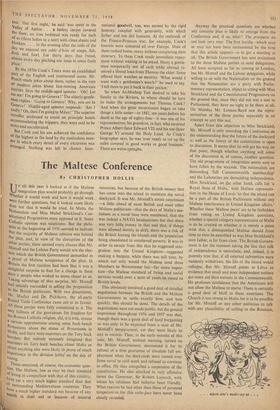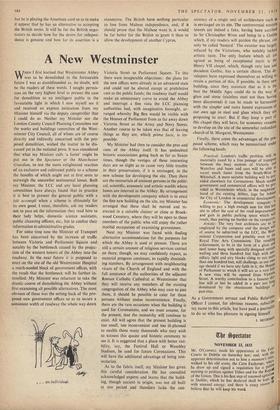The Maltese Conference
By CHRISTOPHER HOLLIS Up till this year it looked as if the Maltese integration plan would probably go through. Whether it would work and how it would work Were further questions, but it looked more likely than not that it would be tried. In Malta the Nationalists and Miss Mabel Strickland's Con- stitutional Progressives .were opposed to it. Some Catholic opinion was suspicious. But the plebi- scite at the beginning of 1956 seemed to indicate that the majority of Maltese opinion was behind the plan, and, in view of the disruption of the other parties, there seemed every chance that Mr. Mintoff and the Labour Party would win the elec- tion which the British Government demanded as a proof of Maltese acceptance of the plan. In Britain the first reaction had been that it was a delightful surprise to find for a change in these days a people who wished to move closer to us. Taking advantage of that surprise, Mr. Mintoff had astutely succeeded in selling the proposition to the British pOliticians. With two dissentients, Mr. Maclay and Dr. Pickthorn, the all-party Round Table Conference came out in its favour. All three parties were fully committed to it. The very fullness of the guarantees for freedom for the Roman Catholic religion, did, it is true, arouse a certain apprehension among some back-bench Protestants about the status of Protestants in Malta, and there were murmurs on the Tory back benches. But nobody seriously imagined that murmurs on. Tory back benches about Malta or about anything else were likely to prove of much Importance in the division lobby on the day of voting.
There remained, of course, the economic ques- tion. The Maltese, low as may be their standard of living in comparison with that of this country, have yet a very much higher standard than that Of surrounding Mediterranean countries. They have a much higher standard not because of any Wealth in their soil or because of mineral
resources, but because of the British money that has come into the island to maintain the naval dockyard. It was Mr. Mintoff's astute conclusion —a little ahead of most British and most other Maltese politicians—that the days of Malta's use- fulness as a naval base were numbered, that she was indeed a NATO headquarters but that there was very little money in that and that, if things were allowed merely to drift, there was a risk of the British leaving the islands and the population being abandoned to unrelieved poverty. It was in order to escape from this that he suggested inte- gration into the United Kingdom—suggested making a bargain, while there was still time, by which not only would the Maltese send three Members to Westminster but—far more impor- tant—the Maltese standard of living and social services would over a term of years be raised to British levels.
This obviously involved a good deal of detailed negotiation between the British and the Maltese Governments to settle exactly how, and how quickly, this should be done. The details of the negotiations were not made public, but the general impression throughout 1956 and 1957 was that, though there was a good deal of hard bargaining as was only to be expected from a man of Mr. Mintoff's temperament, yet they were likely to end in success. Then, in the early months of this year, Mr. Mintoff, without warning, turned on the British Government, denounced it for its refusal of a firm guarantee of absolute full em- ployment when the dockyards were turned over from naval to civil work and refused to continue in office. He thus compelled a suspension of the constitution. He also attacked in very offensive terms the Governor, Sir Robert Laycock, with whom his relations had hitherto been friendly. What reasons he had other than those of personal temperammt for this volte-face have never been clearly revealed.
Anyway the practical questions are whether any concrete plan is likely to emerge from the Conference and, if so, what? The prospects do not look very rosy. The first hurdle—which may or may not have been surmounted by the time that this article appears—is to get a meeting at all. The British Government has sent invitations to the three Maltese parties to send delegations. All have accepted so far as coming to London, but Mr. Mintoff and the Labour delegation, while willing to sit with the Nationalists on the groimd that the Nationalists are a party with Parlia- mentary representation, object to sitting with Miss Strickland and the Constitutional Progressives on the ground that, since they did not win a seat in Parliament, they have no right to be there at all. On Monday Mr. Lennox-Boyd saw the repre- sentatives of the three parties separately in an attempt to sort this out.
Apart from this objection to Miss Strickland, Mr. Mintoff is only attending the Conference on the understanding that the future of the dockyard as well as the future of the constitution is open to discussion. It seems that he will get his way on that point, though whether anything will come of the discussion is, of course, another question. The old programme of integration seems now to have fallen by the wayside. The nationalists are demanding 'full Commonwealth membership' and the Labourites are demanding independence. Miss Strickland, on the other hand, calls for 'a Royal State of Malta,' with Maltese representa- tion in the House of Lords `so that the island can be a part of the British Parliament without any Maltese interference in United Kingdom affairs.' Whether these 'Maltese peers' are to be forbidden from voting on United Kingdom questions, whether a special category representative of Malta is to be created or whether it is merely a pious wish that a distinguished Maltese should from time to time be ennobled as was Miss Strickland's own father, is far from clear. The British Govern- ment is for the moment taking the line that talk Of independence is unrealistic, and, indeed, it is patently true that, if all external subvention were suddenly withdrawn, the life of the island would collapse. But Mr. Mintoff points to Libya as evidence that small and poor independent nations get more aid than nations in the Commonwealth. He professes confidence that the Americans will not allow the Maltese to starve. There is certainly a good deal of bluff in these assertions. The Church is too strong in Malta for it to be possible for Mr. Mintoff or any other politician to talk with any plausibility of calling in the Russians,
. . . upon one's make-up as . . .
but he is playing the American card so as to make it appear that he has an alternative to accepting the British terms. It will .be for the British nego- tiators to decide how far the desire for indepen- dence is genuine and how far its assertion is a manoeuvre. The British have nothing particular to lose from Maltese independence, and, if it should prove that the Maltese want it, it would be far better for the British to grant it than to allow the development of another Cyprus.















































































 Previous page
Previous page